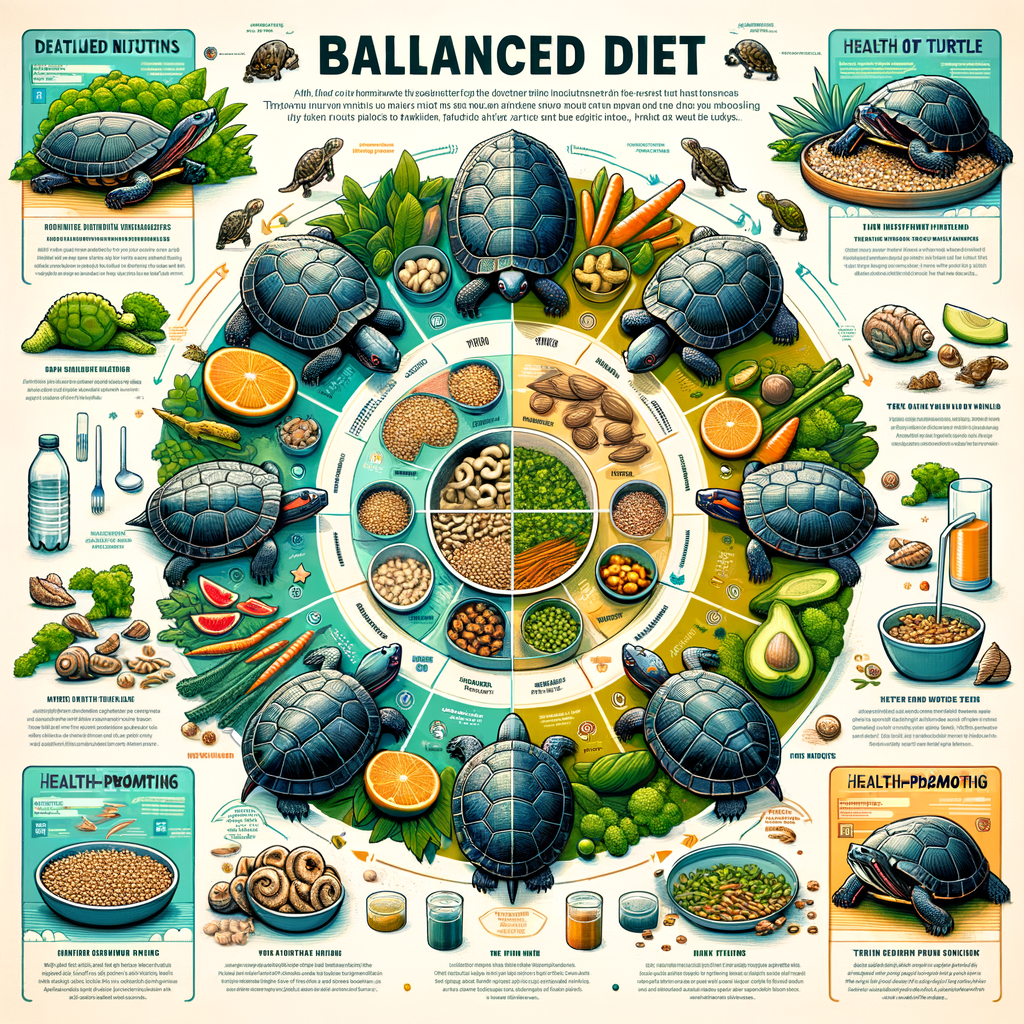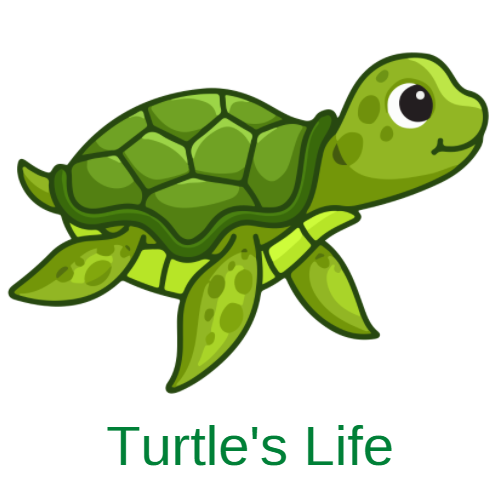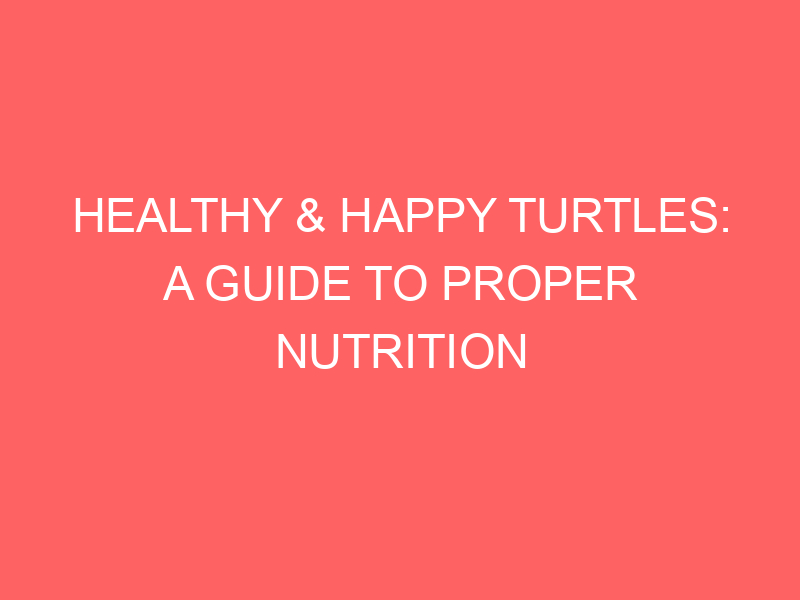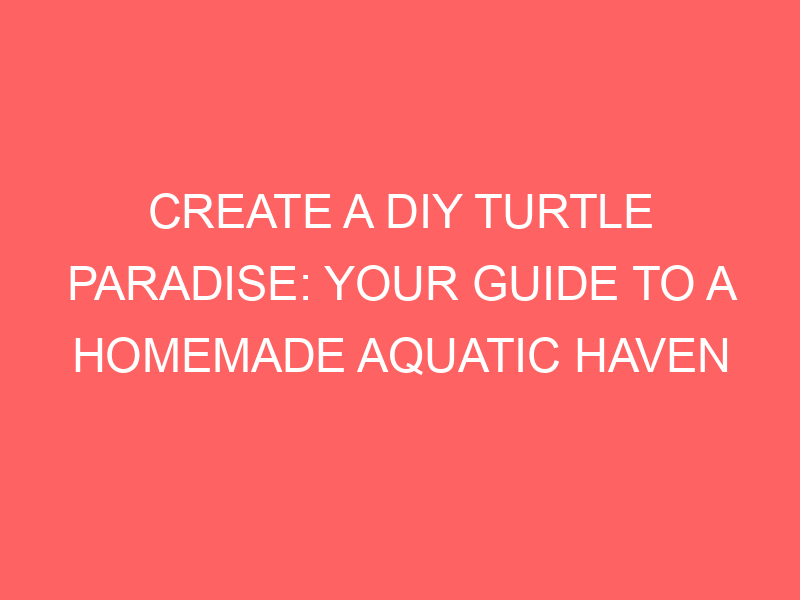
Introduction: The Importance of a Balanced Diet for Turtles
Just like humans, turtles need a balanced diet to stay healthy and happy. A proper diet ensures that turtles grow well and live long, fulfilling lives. This article will provide an overview of turtle dietary needs and discuss the role of nutrition in turtle health and happiness.
- Overview of Turtle Dietary Needs
- The Role of Nutrition in Turtle Health and Happiness
Turtles are diverse creatures, and their dietary needs can vary greatly depending on their species. Some turtles are herbivores, meaning they eat only plants. Others are omnivores, eating a mix of plants and meat. Regardless of their specific diet, all turtles need a balance of proteins, carbohydrates, and vitamins to stay healthy.
Proteins help turtles grow and repair their bodies. Carbohydrates provide them with the energy they need to swim, bask, and explore. Vitamins are essential for a variety of bodily functions, including bone health and immune system function.
A balanced diet is crucial for a turtle’s health and happiness. Turtles that eat a balanced diet are less likely to get sick and more likely to live longer. They also tend to be more active and display more natural behaviors, indicating that they are happy and content.
On the other hand, turtles that do not get the right nutrients can suffer from a variety of health problems. These can range from minor issues like slow growth and dull shells to major problems like metabolic bone disease and even death. Therefore, providing a balanced diet is one of the most important things you can do for your turtle’s health and happiness.
In the following sections, we will delve deeper into turtle nutrition, provide a practical guide to feeding your turtle, and share some nutritious meal recipes and recommendations. By the end of this article, you will have all the information you need to ensure your turtle’s dietary needs are met.
Understanding Turtle Nutrition
When it comes to turtle nutrition, it’s important to understand that a balanced diet is key to their health and longevity. Just like us, turtles need a variety of nutrients to thrive. Let’s delve into the key components of a healthy turtle diet.
Key Components of a Healthy Turtle Diet
A healthy turtle diet consists of three main components. These are:
- Proteins
- Vitamins and Minerals
- Fiber
Proteins are essential for the growth and development of turtles. They help in the formation of muscles, skin, and shell. Foods rich in protein include insects, fish, and some types of meat. However, the amount of protein a turtle needs can vary depending on its species and age. For example, young turtles need more protein than adults for growth.
Vitamins and minerals are vital for a turtle’s overall health. They support various bodily functions such as bone formation, vision, and immune system function. Turtles can get these nutrients from a variety of foods including leafy greens, fruits, and vegetables. It’s also important to provide a calcium supplement to ensure healthy shell growth.
Fiber plays an important role in a turtle’s diet. It aids in digestion and helps prevent constipation. Turtles can get fiber from a variety of plant-based foods such as leafy greens, fruits, and vegetables. Remember, a turtle’s diet should be varied to ensure they get all the nutrients they need.
Understanding the nutritional needs of your turtle is crucial for its health and well-being. By ensuring a balanced diet, you can help your turtle live a long and healthy life.
Common Misconceptions About Turtle Diet
When it comes to turtle nutrition, there are a few misconceptions that often lead to improper feeding habits. Let’s debunk two of the most common myths:
- Myth 1: Turtles only eat plants
- Myth 2: All turtles have the same diet
While it’s true that many turtles enjoy a good leafy meal, they are not strictly herbivorous. In fact, most turtle species are omnivores. This means they eat a mix of both plants and meat. Depending on the species and age, turtles may enjoy a diet that includes insects, fish, and even small mammals. Therefore, feeding your turtle only plants could lead to a lack of essential nutrients, particularly proteins, which are vital for their growth and overall health.
This is another common misconception. Just as humans have different dietary needs, so do turtles. The diet of a turtle can vary greatly depending on its species, age, size, and habitat. For instance, a sea turtle’s diet is vastly different from that of a land-dwelling tortoise. While sea turtles may feast on jellyfish and algae, tortoises might prefer a diet rich in leafy greens and fruits. Therefore, it’s essential to research and understand the specific dietary needs of your turtle’s species to ensure they receive a balanced and nutritious diet.
Understanding and debunking these myths is the first step towards providing your turtle with the right nutrition. Remember, a well-fed turtle is a happy and healthy turtle!
Appropriate Turtle Feeding: A Practical Guide
Feeding your pet turtle correctly is crucial for its health and longevity. This section will guide you on what to feed your turtle, when to feed it, and how much to feed.
Feeding Pet Turtles: What, When, and How Much
-
Understanding Different Types of Turtle Food
Turtles are omnivores, which means they eat both plants and meat. Their diet can include a variety of foods such as vegetables, fruits, insects, and even small fish. Commercial turtle food is also available and often contains a balanced mix of nutrients essential for your turtle’s health.
It’s important to note that different species of turtles have different dietary needs. For example, a Red-Eared Slider’s diet consists mainly of vegetables and fruits, while a Box Turtle’s diet is more carnivorous. Always research your specific turtle species to ensure you’re providing the right food.
-
Feeding Schedule and Portion Sizes
How often and how much you feed your turtle depends on its age, size, and species. Young turtles usually need to be fed daily, while adult turtles can be fed every other day or even less frequently. As a general rule, the amount of food you give your turtle should be about the size of its head.
Overfeeding can lead to obesity and other health problems, so it’s important to monitor your turtle’s weight and adjust its feeding schedule as necessary. Remember, a hungry turtle is a healthy turtle!
In conclusion, feeding your pet turtle appropriately involves understanding its dietary needs, sticking to a regular feeding schedule, and providing the right portion sizes. By following these guidelines, you can ensure your turtle stays healthy and happy.
Turtle Feeding Tips for Optimal Health
Feeding your pet turtle appropriately is essential for its overall health and longevity. Here are some key tips to ensure your turtle is getting the nutrition it needs.
- Tip 1: Variety is key
- Tip 2: Monitor your turtle’s weight and adjust feeding accordingly
Just like humans, turtles need a varied diet to get all the nutrients they need. A turtle’s diet should include a mix of vegetables, fruits, and proteins. Vegetables can include leafy greens like spinach, while fruits can include apples and berries. For proteins, consider feeding your turtle mealworms or small pieces of cooked chicken. Remember, the exact mix will depend on your turtle’s species, so always consult with a vet or a turtle care expert.
Keeping an eye on your turtle’s weight is crucial. If your turtle is gaining too much weight, it might be eating too much or not getting enough exercise. On the other hand, if it’s losing weight, it might not be eating enough or could be sick. A healthy turtle should have a steady weight, so if you notice any significant changes, it’s best to consult with a vet. Adjust your turtle’s diet based on its weight and activity level to ensure it’s getting just the right amount of food.
Remember, every turtle is unique, and what works for one might not work for another. Always monitor your turtle’s health and adjust its diet as needed. With the right care and attention, your turtle can live a long, healthy life.
Nutritious Turtle Meals: Recipes and Recommendations
Feeding your turtle a balanced diet is crucial for their health and longevity. Here, we will share two homemade recipes that are not only delicious for your turtle but also packed with essential nutrients they need.
Healthy Turtle Food: Homemade Recipes
Homemade meals can be a great way to ensure your turtle is getting the right balance of nutrients. Here are two recipes you can try:
- Recipe 1: Protein-packed meal
- Ingredients: 1/4 cup of cooked chicken, 1/4 cup of cooked fish, and a handful of chopped leafy greens.
- Instructions: Mix the chicken and fish together. Add the chopped greens and mix well. Serve this meal to your turtle once a week.
- Recipe 2: Vitamin-rich salad
- Ingredients: A handful of chopped kale, a handful of chopped spinach, and a small carrot, grated.
- Instructions: Mix all the ingredients together and serve. This salad can be given to your turtle every other day.
This meal is rich in protein, which is essential for your turtle’s growth and health. Here’s how to prepare it:
This salad is packed with vitamins that can boost your turtle’s immune system. Here’s how to make it:
Remember, variety is key in a turtle’s diet. Try to rotate between these recipes and other healthy foods to ensure your turtle is getting all the nutrients they need.
Recommended Commercial Turtle Food
While homemade turtle meals are a great way to ensure your pet is getting the nutrients it needs, there are also a number of commercial turtle foods available that are both convenient and nutritionally balanced. Let’s take a look at two highly recommended options:
- Product 1: High-quality pellet food
- Product 2: Nutrient-dense canned food
Pellet food is a popular choice for turtle owners due to its convenience and balanced nutrition. High-quality pellet food is specially formulated to provide all the essential nutrients your turtle needs. It’s easy to serve and most turtles find it appetizing. Just remember to soak the pellets in water before feeding to soften them, making it easier for your turtle to eat.
Canned turtle food is another excellent option. It’s packed with a variety of nutrients and is often made with real fish, insects, and vegetables, providing a well-rounded diet for your pet. The soft texture of canned food is also beneficial for turtles, as it closely mimics the consistency of their natural diet in the wild. Always check the expiration date before feeding and refrigerate after opening to maintain its freshness.
Remember, variety is key in a turtle’s diet. While commercial food can be a major part of their meals, it’s important to supplement with fresh fruits, vegetables, and proteins to ensure a balanced diet. Always consult with a vet or a turtle care expert to determine the best feeding plan for your specific breed of turtle.
Conclusion: Ensuring Your Turtle’s Dietary Needs Are Met
As we wrap up this comprehensive guide on turtle nutrition, it’s essential to revisit the key points we’ve discussed. These insights will help you provide the best care for your turtle, ensuring it lives a healthy, happy life.
- Recap of key takeaways
- Final thoughts on the importance of proper turtle nutrition
Understanding the nutritional needs of your turtle is crucial. Turtles require a balanced diet, which includes a mix of vegetables, fruits, and proteins. The type of food and the quantity to feed your turtle will depend on its species, age, and health condition.
Feeding your turtle appropriately involves not just providing the right foods, but also feeding them at the right times. Overfeeding or underfeeding can lead to health issues.
We also discussed some nutritious turtle meals, providing you with recipes and recommendations to ensure your turtle gets the necessary nutrients.
Proper nutrition is the cornerstone of your turtle’s health. It’s not just about feeding your turtle; it’s about providing a balanced diet that meets all its dietary needs. Remember, a well-fed turtle is a happy and healthy turtle.
As a responsible turtle owner, it’s your duty to ensure your pet gets the right nutrients in the right amounts. This may seem like a daunting task, but with the right information and a little practice, you can become an expert in turtle nutrition.
In conclusion, taking care of a turtle requires knowledge, patience, and dedication. But the reward of seeing your turtle thrive is well worth the effort. Here’s to a long, healthy life for your turtle!














